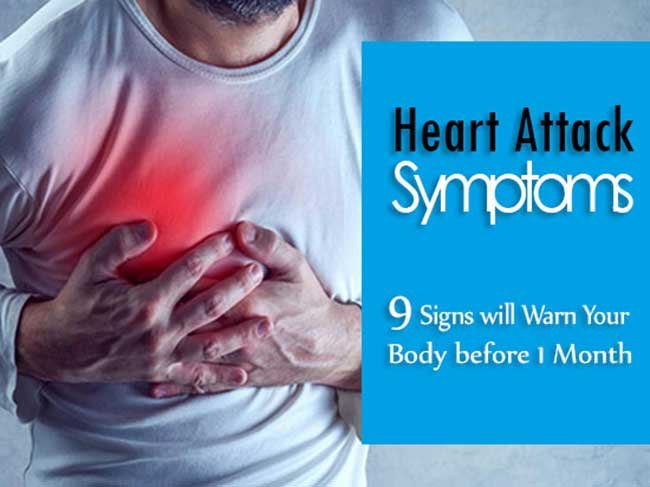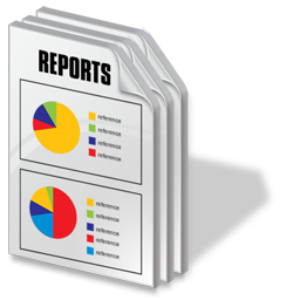
Heart Attack Symptoms: It is better for all the time if you can stop a disease primarily than to treat it. This rule should be regarded for every illness. In this post, we are informing you about 9 heart attack symptoms that people usually overlook; however, these symptoms may indicate the chance of falling into an unexpected heart attack.
It will be good if you are conscious of your health.
Know these symptoms; you will be able to care for yourself.

Heart Attack Symptoms:
These 9 Heart Attack Symptoms will Warn your Body before 1 Month-
Read More: How to Prevent Heart Attack and Stroke at Home: Study Report
Cold Sweats and Dizziness:
If your body has poor blood flow, your brain will not get the proper oxygen that is needed to work properly.
This is a symptom that you are in danger.
Try to find medical assistance if your dizziness and cold, sweats do not dropdown.
Chest Pressure:
This is one of the possible heart attack indicators. It’s called “angina pectoris”.
This happens if your heart does not get adequate oxygen-rich blood.
Many people overlook this symptom because they think it’s just acid reflux.
But if your stress continues regularly, it’s a direct symptom that a heart attack may occur.
Feeling Weak:
If you feel weak or start sweating, feel nausea, or have jaw pain, you might be under the threat of suffering a heart attack.
These symptoms happen for the reason that your arterial blood vessels are becoming too thin.
At what time your arteries turn narrow, there is no longer appropriate blood flow all over the body.
If your heart does not get enough blood, it will fail.
Flu-Like Indications:
If you start developing flu-like symptoms, you are in danger of suffering a heart attack.
These symptoms comprise fever, tiredness, and chest pain.
These indications may continue for 2-10 days.
Depends on your age, if you are an older person and can’t put up with these symptoms, go to your doctor instantly.
This symptom doesn’t mean; you are in danger of having a heart attack, but (flu or a cold) needs to be monitored.
Sudden Weakness:
An unexpected tiredness feeling without any reason may be a sign of an upcoming heart attack.
In that situation, your heart has to function harder as arteries start to close, then it can make simple fatigue feeling.
Women may experience unusual fatigue, sleeplessness, or abnormal upsets in their sleeping patterns.
Short of Breathing:
Your Lung can be suffered from a lack of blood flow.
If your lungs do not get adequate blood, you will not be able to take enough air through breaths.
As a result, your brain will not be able to get adequate oxygen.
Not getting adequate air in breathing may occur a heart attack.
Sleeplessness:
Insomnia happens more in women than men.
It is directly connected with the danger of a heart attack or stroke.
It is followed by concern and lack of memory.
The symptoms are trouble falling asleep, waking up early, feeling sick and tense.
Arrhythmia:
Arrhythmia signifies a missing heartbeat that occurs in panic attacks and anxiety.
Generally, it happens more to women than men.
It occurs unexpectedly irregular heartbeat, or increased heart speed (arrhythmia).
Your heart speed may be increased by physical activities also, particularly in the cases of coronary artery disease condition.
This abnormal heartbeat continues for a while.
But, if it lasts longer, you may feel dizziness with severe exhaustion, and you require to instantly call your doctor.
Stomach Pain:
Occasionally, the pain occurred by a heart attack is said as stomach pain, pain in the center of the upper belly, abdomen sickness, feeling puffy, or having stomach trouble – these all are regular signs.
Women may suffer from an upset stomach or a loss of craving, whereas a man may have troubles with nausea.
What are the Risk Factors for a Heart Attack?
Smoking, lack of physical exercise, and obesity are the most common risk factors.
But, there are some other factors that people do not usually see, however they are important to avoid a heat stroke.
- Men may get hair growth in the ear passage.
- At the time of walking, you may feel slightly sore in the calf muscles.
- If the inside corner of your eye has yellow spots.
- Earlobe Crease
What Should You Do?
- If you feel these symptoms, ask your doctor for being checked instantly. You require calling 911 even if you are experiencing heart attack symptoms.
- The person should not be walked around.
- Keeping a person to be relaxed during a heart attack is difficult; however, stop him or her from being too chatty and ask many unrelated individual questions. Getting answers to your questions may be too challenging for the person.
- At the time of waiting for emergency help, keep the patient warm by using a jacket or a blanket.
- If you are not confirming the dose, manage a nitroglycerine tablet or spray (at least 2 pumps) under the tongue.
- After giving nitroglycerine, the person may become dizzy or faint soon, so confirm he or she is safe, sitting down, not to be fallen and hit her head.
- Giving to chew an aspirin will allow the body to absorb it faster.
- Aspirin (A dose of 300 mg) can be given at the same time with nitroglycerine.
- A person with heart attack symptoms should not smoke.
- Confirm to eat healthy foods, check your cholesterol, exercise on a regular basis, and lower tension.
Remember, time is very important when an unaware person stops breathing. Brain damaging starts after 4 to 6 minutes if it doesn’t get enough oxygen.








